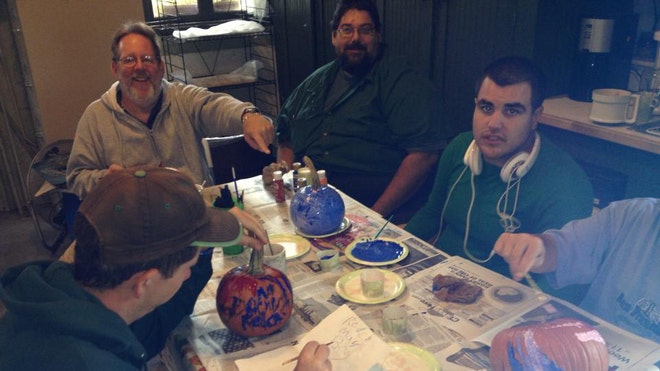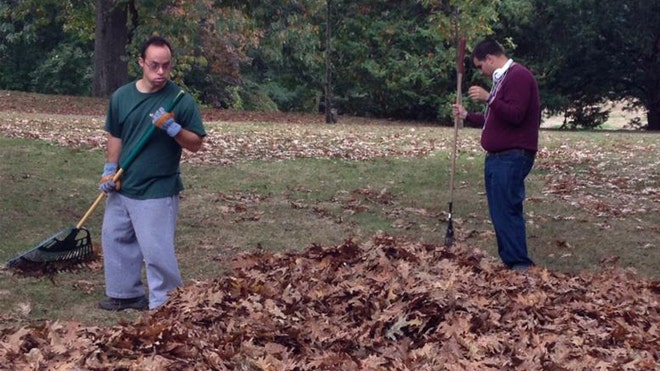
Billy Pagoni is refusing to give up on his hopes for a higher education.
Diagnosed with severe autism at 18 months old, 21-year-old Billy has trouble speaking and communicating with others, making it difficult for him to integrate into a typical college environment.
Nevertheless, Billy had always dreamed of attending college, with hopes of one day becoming a professional chef. However, according to his mother, Edith, there are currently no university programs suited to meet his special needs.
In an attempt to fix this educational gap, Billy made a public plea to President Obama in April 2012, asking for his help to enroll in a secondary school. While his video prompted a response from the White House, the Pagonis feel the problem still hasn’t been fully addressed, forcing them to seek more creative routes to further Billy’s educational career.
Now, having just completed his senior year of high school, Billy has enrolled in a special vocational program developed by a Connecticut-based company called G.R.O.W.E.R.S. Inc., where he works in a greenhouse, learning how to tend to plants and herbs.
“What they’re doing is breaking down the skills,” Edith Pagoni, the director of KNEADS, a non-profit social and vocational program for adolescents and young adults with autism, told FoxNews.com. “He works in the gardens now; he does pruning, floral arrangements, and natural herbs…He’s really learning as he’s going, and we’re hopefully developing for him the ability to take an online course for him to be a sous chef.”
A bumpy road to education
In order to provide Billy with a good education growing up, Edith enrolled him in an applied behavioral analysis (ABA) program at Rutgers University, where he learned to read, write and speak. She then had to convince local school systems in Connecticut, where the Pagoni family lived, to incorporate the program into their curriculum.
Later, when the family moved to Naples, Fla., they fought to have the ABA program incorporated in schools there as well.
While growing up in Florida, Billy was inspired to take up baking classes after he went to visit a German bread baker. Ever since then, Billy has wanted to become a professional baker or chef, but when it came time to register him in more specialized, university-level programs, Edith found the options to be incredibly scarce.
“They tell me there’s no place for him,” Pagoni told FoxNews.com in 2012 about the search process. “He [went] to school every day, he [got] A’s in a specialized curriculum, but he’s being denied a post-secondary experience.”
Feeling as though Billy had little to no opportunities to attend an institution for higher learning, the Pagonis appealed to an unlikely source: the President of the United States. In a video posted to Facebook, Billy read from a letter addressed to the Commander in Chief, imploring him to create opportunities for himself and other autistic individuals.
“Dear President Obama, my name is Billy Pagoni,” Billy recited. “I want to be a baker. I am a great student. I never miss a day of school. I get A’s on my report card. Please, can you help me go to college? I am an American. I am autistic.”
The video garnered attention from people all over the world, as well as feedback from a White House spokesperson, who provided Edith with a list of colleges that offered educational programs for autistic students. However, after meeting with these colleges, Edith found their programs to be more geared towards those with high functioning autism, such as Asperger’s syndrome – and since Billy had a more severe form of the disorder, he couldn’t quite fit in.
As a result, Edith was forced to find alternative solutions to meet Billy’s educational needs.
Growing with G.R.O.W.E.R.S.
Fortunately, Billy was able to get a glimpse of the college experience when his family moved back to Connecticut and enrolled him in a special program at Quinnipiac University in Hamden. There, he was able to finish his senior year of high school while living on campus and learning how to function on his own.
But after graduating in May of 2013, Billy still wanted to continue his educational career. That’s when Edith stumbled upon G.R.O.W.E.R.S. Inc., a company aimed at helping people with developmental disabilities perform useful skills and tasks in a normal work environment.
Edith said this program has been extremely beneficial for Billy, as they try to assess his options for future education and employment.
“We’re kind of in a transitional stage,” Edith said. “He really wants to continue with that post-secondary academic experience, but we have to carve it out for them, because there really are no programs out there.”
At G.R.O.W.E.R.S – stands for Growing Real Opportunities with Educational Relationships and other adults work together to grow flowers and plants in a greenhouse, attending additional responsibilities surrounding the horticulture business. The program is meant to cultivate the specific needs of each participant, depending on what they want to achieve in the future.
“Each individual has different goals,” Scott Hickman, president and owner of G.R.O.W.E.R.S., told FoxNews.com. “There’s basically a support team around each individual…Some may have dreams (of) working for a landscaper. Some people have been there since 1975 and would feel uncomfortable if they had to go anywhere else. Some want to increase their work skills. It’s great for self-esteem and from person to person it differs.”
Hickman originally ran a similar vocational program for a larger agency in the mid-1990s, but it was canceled by the company due to budget costs. However, Hickman had seen firsthand how beneficial the program had been for people with disabilities, so he decided to create G.R.O.W.E.R.S. to continue giving individuals opportunities that might otherwise be unavailable to them.
Like Edith, Hickman agrees that there is a significant lack of valuable educational opportunities for adults with autism.
“With a lot more people coming of age with autism, there’s going to have to be more programs available,” Hickman said. “I think research needs to continue and funding for programs is absolute key. One of the things I hate to see is seeing an agency that turns into a babysitting service…What we offer, and what needs to be offered more in programs, are activities that are connected with something worthwhile.”
Though Billy loves working at G.R.O.W.E.R.S., Edith says there is still much more work to be done in order to give Billy and other young adults with autism the opportunity to attend school and someday participate in a normal work environment.
Now, Edith says she has a novel business model that can do just that.
A roadmap for the future
While Billy continues to work with G.R.O.W.E.R.S., Edith’s non-profit KNEADS has teamed up with Autism Speaks, in order to carve out a more tailored roadmap for his future. Together, they are working on developing a new educational model for restaurants and other businesses, which could be mutually beneficial for both the companies and autistic individuals who want to go to work.
According to Edith, franchise restaurants – such as Subway or Chili’s – could easily carve out jobs suitable for people with autism. Meanwhile, these businesses could partner with local colleges to develop certificate programs specially designed to educate autistic individuals on how to operate in these positions. Then, once an individual finished the program, he or she could immediately start working at one of the restaurants, using the distinct set of skills he or she learned at school.
“If they could carve certain jobs out and then bring it to a vocational trade school and call it a program, then they would have a path towards employment,” Edith said. “But we need to get these companies to pull together to understand that that would be a great path with someone with autism.”
Edith said that while there are more programs geared towards individuals with high-functioning autism, there are very few options for adults like her son, who have trouble communicating. She said as long as this educational gap exists, she will continue to fight for opportunities for Billy, so that he can become the person he wants to be.
“As a parent, you can have all the money in the world, but if your son or daughter is not connected, then it feels like you’ve failed,” Edith said. “These major franchises that are in business: Let us help you. There are so many that we can plug into.”
Source: fox news




